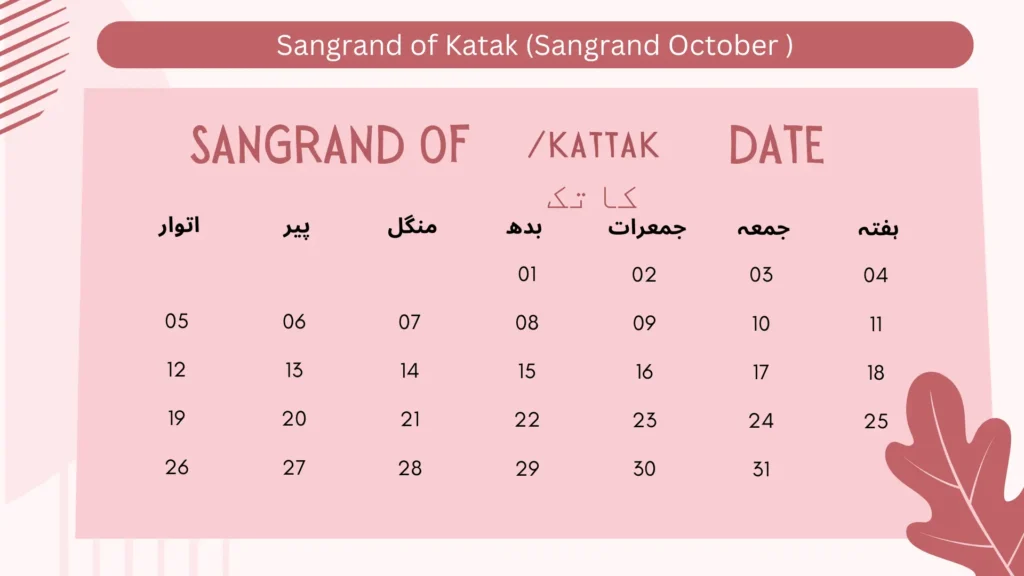Sangrand of Kattak in October According to the Nanakshahi Samvat Calendar
On October 15th, it is the Sangrand of Kattak, also known as Katik. The Sangrand of Kattak marks the change of the month. On this day, Sikhs celebrate the Sangrand of Kattak.
You can view the list of all Sangrand dates for each month in the current year. You can also see the English calendar dates for Sangrand in January, February, March, April, May, June, July, August, September, November, and December for the current year.

Observance of Sangrand
Sangrand (ਸੰਗਰਾਂਦ) is the change of the month, and just like in these Western countries, many of us go to the Gurdwara (ਗੁਰਦਵਾਰਾ, Sikh temple) and participate in Sadh Sangat (ਸਾਧ ਸੰਗਤ, holy congregation) on a Sunday. In the old days, Guru Sikhs (ਗੁਰਸਿੱਖ, Sikh disciples) would come together at the start of a new month to receive the teachings.
Teachings Through Bara Maha
Through Bara Maha, Guru Arjan Dev Sahib Ji, in the Mahajraag, and Tukhari Raag, Guru Nanak Dev Sahib Ji has given us teachings about Sangrand of Kattak to carry for the rest of that month. In Kattak, Guru Arjan Dev Sahib Ji starts their teachings: “Katik Karm Kamavane, dos na kahujog.”
The Blessed Month of Kattak (Katik)
Importance of Kattak (Sangrand of Kattak)
This month of Kattak, on the full moon, Puranmashi, is a blessed time because Sahib Sri Guru Nanak Dev Sahib Ji came to this earth. The full moon of Katik is when Guru Nanak Dev Sahib Ji, the form of God, first came to this earth to bless all humanity.
The Teachings: Katik Karm Kamavane
“Katik Karm Kamavane” (ਕਾਤਿਕ ਕਰਮ ਕਮਾਵਣੇ) means “to complete actions in this month of Katik.” “Karm” (ਕਰਮ) refers to actions, and “Kamavane” (ਕਮਾਵਣੇ) means to complete those actions. “Dos na kahujog” (ਦੋਸ ਨ ਕਹੂਜੋਗ) teaches us not to blame anyone else for the actions we complete in this month of Kartik. That is the teaching Guru Arjan Dev Sahib Ji has given us.
Personal Accountability in Kattak (Sangrand of Kattak)
The Concept of Dos na kahujog
So in this blessed month, the month when Guru Nanak Dev Sahib Ji came to this world, if we forget Vaheguru (ਵਾਹਿਗੁਰੂ, God’s name) and stray from the path, losing our love for Vaheguru and engaging in negative actions, we should not blame Vaheguru for leading us astray. Sometimes, we blame God and ask, “Why did this happen to us? Why did that happen to us? Why didn’t you bless me like you blessed someone else?” We also blame our families or friends for leading us astray.
Accepting Responsibility during Sangrand of Kattak
During the Sangarnd of Kattak or in this month of Katik, we are taught “dos na kahujog” (don’t blame anyone but yourself). Whatever we do, we do with our own hands: “Ape bij ape hi kaho” (ਆਪੇ ਬੀਜ ਆਪੇ ਹੀ ਕਹੁ), meaning whatever we sow, we shall reap. That is the teaching of Gurmat (ਗੁਰਮਤ, the Guru’s wisdom). Whatever actions or “Karam” (ਕਰਮ) we do, we must face the consequences.
Understanding Types of Karam
The Three Types of Karam
There are three types of Karam: “Paralabad,” “Keryaman,” and “Sanjit.” Guru Gobind Singh Sahib Ji explained this to Bhai Daya Singh Ji, one of the Panj Pyare (ਪੰਜ ਪਿਆਰੇ, the five beloved ones), when they asked this question.
Keryaman
- Keryaman (ਕਰਿਆਮਾਨ): Actions that we are currently doing. For example, speaking is a Keryaman action.
Sanjit
- Sanjit (ਸੰਜਿਤ): Once actions are completed, they become Sanjit Karam, which means to collect. These actions are then recorded. Our accounts of good and bad actions are constantly being recorded.
Paralabad
- Paralabad (ਪ੍ਰਾਲਬਧ): When we leave this world, all the actions from our previous lives are collected and affect our next life. Paralabad Karam are the actions we carry from our previous lives.
Impact of Paralabad Karam
The Paralabad Karam determines aspects of our lives, such as our food (“Dhan Pani”), the time and place of our death, and the people we meet. Our past actions decide these, and they determine our connections and separations in this life.
The Teachings of Gurmat during Sangrand of Kattak
Performing Nishkam Actions
The teachings of Gurmat encourage us to perform “Nishkam” (ਨਿਸ਼ਕਾਮ) actions, which are selfless deeds, and to engage in “Prem Bhakti” (ਪ੍ਰੇਮ ਭਗਤੀ, loving devotion) towards the Almighty Lord. Through these actions, our past negative actions can be burned away. Each time we say “Vaheguru,” each time we meditate on the Lord, our past actions are diminished. The Paralabad Karam we face in this life becomes smaller because our Guru blesses us.
Stories of Reduced Consequences
There are many Sakhis (ਸਾਖੀਆਂ, stories) where Guru Sahib Ji reduced the impact of our actions. In one Sakhi, two Guru Sikhs, one who does good actions and one who does evil actions, test each other. The one who does terrible actions finds a gold coin under a tree, while a thorn pricks the one who does good. They go to Guru Ji, who explains that the one doing evil actions had done good in a previous life, and the one doing good now had done wrong previously. Their actions in this life reduced or increased the consequences.
Benefits of Good Actions during Sangrand of Kattak
Good actions, such as Sangat (ਸੰਗਤ, holy company), repeating the Lord’s name, and doing Seva (ਸੇਵਾ, selfless service), reduce the negative impact of past actions. Guru Ji protects us, but if we do evil actions, “Har bisrat, teray gun galay” (ਹਰਿ ਬਿਸਰਤ, ਤੇਰੇ ਗੁਣ ਗਲੇ), meaning forgetting the Lord diminishes our virtues.
Conclusion: Lessons from Kattak
During the sangrand of Kattak or in this month of Katik, we must remember that whatever we sow, we will reap. Let us not blame anyone but accept the “Hukam” (ਹੁਕਮ, divine will) of the Lord. For the future, let us repeat the Lord’s name and perform Nishkam Seva, and our future will be beneficial in this world and the hereafter. Let us hope and pray we can follow these teachings: “Katik Karm Kamavane, Dos na kahujog.” Don’t blame anybody; accept the Hukam and live for the future by engaging in true devotional worship.
